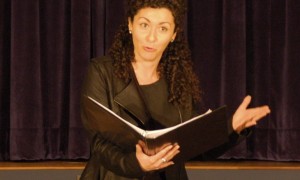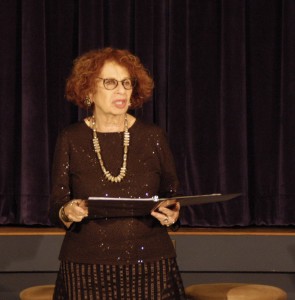Jewish Theatre in L.A. Keeps Storytelling, Tradition & History Alive
by Elyse Glickman Join the party! A group from Garden of Palms will be visiting The Jewish Women’s Theatre on February 17. Transportation and escort will be provided and we’d be delighted to share this experience with you. Families are invited! 
Most of us have gone through life watching films and TV shows that present various archetypes of the Jewish woman: doting Jewish grandmother, witty and wise Jewish mother, the Nice Jewish Girl and her sometimes annoying Jewish Princess counterpart. However, we all know from our life experiences that being a Jewish woman in America is far more complex and complicated than the pop cultural references and literary figures.
Ronda Spinak, Ellen Sandler and Deena Novak felt they needed to do something about those confining perceptions that have defined Jewish women for decades, so in the spring of 2007, over coffee and bagels, they decided to relaunch the dormant Jewish Women’s Theater Project.
“A big goal of our productions is to debunk stereotypes and reflect back to society who Jewish women are today,” says Spinak, the company’s co-founder and artistic director. “We are not the 1950s Neil Simon version of a Jewish woman, we’re not the female characters in Portnoy’s Complaint, and all Jewish women are not Ashkenazi; they’re also Persian, Sephardic, mixed heritage, secular, religious or culturally Jewish. We really want to share the collective voice of Jewish women the way they exist today. Last summer, when anti-Semitism was on the rise, it was a way to share some good news about what it is to be Jewish and female.”
 The trio of theater company veterans started small with a series of productions performed within the concept of “salon theatre” in their first season. Sandler wrote and adapted material, and directed, while Novak produced salon theatre, as well as worked on costumes and props. By May 2008, Spinak developed a viable business plan to expand the company, and eight more women joined the group. Audiences primarily consist of a subscriber base of patrons who follow the shows in the designated “home” or synagogue closest to them, and include almost as many men as women.
The trio of theater company veterans started small with a series of productions performed within the concept of “salon theatre” in their first season. Sandler wrote and adapted material, and directed, while Novak produced salon theatre, as well as worked on costumes and props. By May 2008, Spinak developed a viable business plan to expand the company, and eight more women joined the group. Audiences primarily consist of a subscriber base of patrons who follow the shows in the designated “home” or synagogue closest to them, and include almost as many men as women.
“We began in a back yard, inviting ten people on our board, and then all of their friends, and they all showed up,” Spinak remembers. “We sold subscriptions to our first season of at-home salon theater and had three shows that year on different themes, three performances per show, so ten performances in our first year. Word of mouth spread and we had the same number of performances but more people attended the salons, and one of the ways we expanded was to stage shows with two performances per show on the West Side and one in the Valley.”
In addition to planned shows on the West Side and in the Valley, in the third year the company added shows in Beverly Hills. The current season’s roster of shows has included performances at the Wilshire Boulevard Temple, in West Hills at Shomrei Torah Synagogue, and the Palo Alto Jewish Community Center in Northern California. They also have a new permanent home in Santa Monica, The Braid, where they recently featured Not That Jewish , written and performed by Emmy-award winning writer Monica Piper.
“We created the Jewish Women’s Theater around the notion of reinventing the salon format,” Spinak explains. “Salons have been around since 17th century France, and upper-class Jewish women were known for hosting salons in Germany during the Age of Enlightenment as a way to encourage artists, writers and musicians to explore and push culture further. In our version of salons, we’re also working to push culture further, and we’re using a similar framework to encompass song, poetry, short fiction and monologues as women did back in those days.”
In lieu of full-length plays, the company curates a show around a theme using various performance styles so the talent and audience can explore the theme in greater depth, according to Spinak. Currently those themes include forgiveness, gratitude, kindness, and Bible stories re-imagined from a feminine, contemporary perspective. Actors and other artists range in age from 17 years to their 90s, offering further validation that Jewish women don’t all come in one size or package.
The highly entertaining He Said, She Said, their current production (already extended), explores family and fooling around from both a female and a male perspective. The forthcoming Uncuffed, meanwhile, will reflect the ways women can break with Jewish convention or traditions.
“It’s a lot of work, but if you’re able to deeply touch people in your work, it doesn’t get any better than that,” reflects Spinak. “Years after we’ve done a show, audience members will still come up to me and tell me how the show or a given piece moved them and they remembered it years later. It is so touching to see that we at the Jewish Women’s Theater are telling stories that stay with our audiences for years, and their own personal stories or experiences are also being reflected on the stage.”
